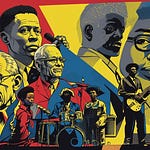Greetings, Reggaeologists!
As the music industry continues to evolve, it's essential to have an ongoing conversation about the forces that shape the music we love, especially within reggae and its interconnected genres.
Today, we're diving into a topic that hits close to home for many artists: the growing pressure to please gatekeepers—engineers, radio pluggers, editors, and music directors—while often losing sight of the real reason they started making music in the first place.
The Industry’s Impact on Authenticity
Let’s face it, the music industry is a highly competitive space where success can feel dependent on meeting external expectations. With streaming platforms, algorithms, and viral moments often deciding what gets heard, it’s easy for artists to get caught in a cycle of creating music that caters to trends rather than to their original inspiration.
This has been particularly evident in reggae, dancehall, and other Caribbean genres, where the drive to conform to international standards sometimes overshadows the raw, organic sounds that first gave the music its power.
From mastering engineers shaping tracks to hit sonic benchmarks for streaming platforms to radio pluggers favoring easily digestible hooks, it seems that the industry’s gatekeepers have become more influential than ever.
But at what cost?
For many artists, especially those emerging from smaller scenes, the allure of visibility can lead to compromises that dilute their creativity.
The idea of crafting music for the sole purpose of gaining radio play or playlist inclusion has made the process feel more transactional and less about genuine self-expression.
The Reggae Connection
This struggle isn’t unique to mainstream pop; it's something the reggae world has grappled with for decades.
Reggae has always been a form of resistance, storytelling, and cultural expression—a voice for the voiceless. Yet, as reggae and dancehall have crossed borders and become global genres, the tension between commercial success and authenticity has grown more complex.
Artists aiming for international airplay often feel pressure to make their music more accessible, conforming to trends rather than staying true to their roots.
Consider the current state of dancehall: the genre’s innovation is still there, but the influence of Afrobeats, EDM, and trap has made its way into the sound, pushing some creators to follow global trends rather than leading with their original flair.
On the flip side, we’re seeing a resurgence of roots-reggae sounds with acts like Chronixx, Koffee, and Protoje, who are challenging the norm by returning to the foundation of the genre while blending modern elements.
Losing the "Why" in Music Creation
In all of this, the fundamental "why" behind creating music is easily forgotten.
Why did you start?
For many artists, the answer is rooted in self-expression, community, and the desire to create something meaningful.
However, in the race to be heard, it’s all too easy to lose sight of this purpose. It’s why some of the most profound and lasting music comes from artists who refuse to conform—those who create from a place of passion, not for radio metrics or playlist inclusion.
It’s also important to remember that true fans are drawn to authenticity. No matter how much the industry pushes for formulaic sounds, listeners can still recognize and appreciate music that comes from the heart.
Reggae and its offshoots have always thrived on this principle. Bob Marley, Peter Tosh, Burning Spear, and Dennis Brown weren’t trying to cater to market demands—they were channeling lived experiences, struggles, and triumphs into their music.
The same goes for today’s revivalists and innovators who balance staying true to their roots while embracing modernity.
A Call for Balance
As the industry shifts, we as creatives, fans, and gatekeepers ourselves must ask: How can artists maintain authenticity while navigating these external pressures?
It’s about finding balance. Yes, the industry has its demands, but artists must remain grounded in their core motivations. Don’t chase trends at the expense of what makes your music unique. Engineers, producers, and industry personnel should collaborate with artists to bring out the best in their creativity rather than molding them to fit a predetermined sound.
Authenticity and success aren’t mutually exclusive. They can coexist.
As the reggae and dancehall worlds continue to grow and evolve, remember that the power of the music comes from its authenticity.
Artists, keep creating from the heart. Industry professionals, continue fostering an environment where genuine creativity thrives. And fans, always support the music that resonates with you, because that is the spirit that keeps Reggae's global fire burning.
Its Laing. I’m Out,
Lloyd “Reggaology” Laing Is A Music Consultant, Curator and Co-founder at 1876Media Group, home of UnityXM Radio Follow him @reggology on all platforms
.
.














Share this post